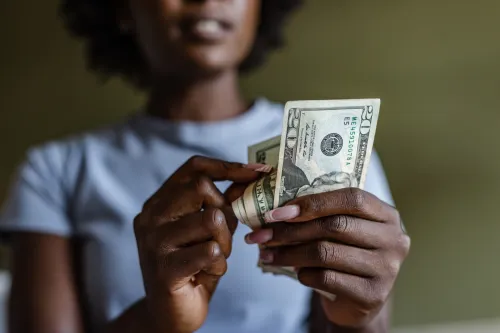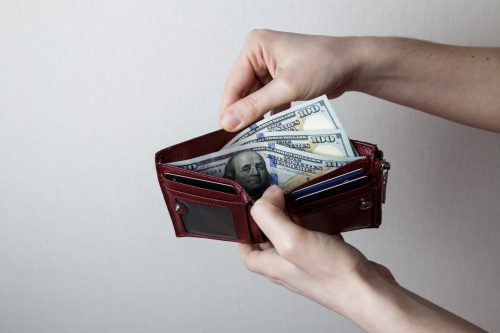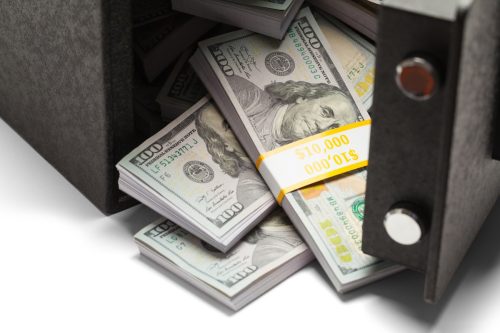How Much Cash Should You Actually Have on Hand? Finance Experts Weigh In

All you really need to pay in person these days is your phone. With Apple Pay, Venmo, Zelle, and CashApp as options, you don’t even need your debit or credit card on hand—much less coins or bills. But don’t be so quick to ditch cash entirely. Financial experts have long warned about the importance of keeping some money on hand in case of unexpected events or emergencies. And this advice hasn’t changed just because there are so many digital platforms available now. So, how much cash should you really be carrying? Read on to find out what our financial experts advise.
READ THIS NEXT: Never Use Your Debit Card for These 6 Purchases, According to Financial Experts.
People are becoming less reliant on cash overall.

While cash was once considered king, its importance in our everyday lives has clearly fallen.
A 2022 Pew Research Center survey found that the share of people going “cashless” in the U.S. is on the rise. According to the survey, 41 percent of respondents say none of their purchases in a typical week are paid for using cash—which is a significant jump from the 29 percent who said the same in 2019.
But most people continue to adhere to the advice that they always have some money on them. “Even though cash is playing less of role in people’s weekly purchases, the survey also finds that a majority of Americans do try to have cash on hand,” the Pew Research Center explained in their report.
Based on the survey, 58 percent of U.S. adults try to make sure they always have cash on hand, while 42 percent say they don’t really worry about whether or not they’re carrying money.
Financial experts say you should have at least $100 in cash on hand.

You should think about your daily spending habits when choosing how much cash to carry with you.
“Maintaining at least a day’s worth of expenses in cash is a smart approach,” says Steven Holmes, a finance expert and the senior investment advisor at iCash. “I advise considering how much money you need to go through a typical 24-hour period, though this can change depending on your daily spending habits.”
According to Donnie Rand, a finance manager at the American Association of Owner Operators, LLC, “An average person should have $100 to $300 in cash on hand. It will be enough for their daily expenses.”
At the same time, you should avoid spending it all without withdrawing more money. “This stash should be replenished as soon as you use it,” Rand adds. “Normally, $100 is enough for one day’s expenses, so you might have to restock daily.”
For more financial advice delivered straight to your inbox, sign up for our daily newsletter
Be careful about how much money is in your wallet.

Having a couple hundred dollars in bills can certainly be useful under a number of unexpected circumstances.
“While there are convenient cashless options, it is essential to have cash in hand should an opportunity arise or an emergency happens,” explains Bill Ryze, a certified chartered financial consultant from Tennessee. “For example, if you go shopping and walk into a grocery store offering discounts to customers paying in cash. This is an example of an opportunity that might pass you by if you didn’t have cash. Also, imagine a situation where you are in a different town, and the gas station has issues processing card payments—what next? Having cash in hand helps bypass these challenges.”
But you should also be wary of keeping too much money on you. “There are only rare occasions when you would need to carry more than $300 on your person,” says Melanie Musson, a finance expert with Clearsurance.com. “You shouldn’t keep all your money in cash because cash is vulnerable. Someone could steal it. A fire could destroy it. You could lose it. Also, it doesn’t earn interest.”
Musson concludes, “While you could be making your money work for you in a bank or through investments, you won’t realize those benefits with cash.”
You should also have cash stored away at home.

While you should only be carrying up to $300 in your wallet every day, that’s not how much cash you should have overall. Alongside the money you have on hand, most financial experts also advise keeping a larger cash reserve hidden away.
“An additional $1,000 should be kept stored away in a safe or lock-box at home,” says Natalie Warb, a financial expert at CouponBirds.
According to Warb, this is the bare minimum you should have stored away in your at-home stash. “In ideal circumstances, this $1,000 will be a starting point that you will then be able to build upon, to the point where you have enough cash savings to cover three to six months’ expenses,” she shares.
Best Life offers the most up-to-date financial information from top experts and the latest news and research, but our content is not meant to be a substitute for professional guidance. When it comes to the money you’re spending, saving, or investing, always consult your financial advisor directly.